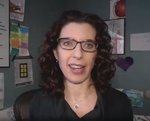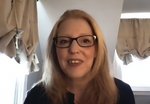

Drs. Megan Ranney and Nicole Nugent explored their work in the medical field and how the pandemic has affected their lives during the latest installment in the RI Bio Women in Science speaker series on Tuesday morning.
Ranney works as an ER doctor at Brown University Emergency Medicine and as the director of the Brown-Lifespan Center for Digital Health. Nugent serves as an associate professor in psychiatry and human behavior, pediatrics and emergency medicine at Brown’s Warren Alpert Medical School. She is also a child clinical psychologist at Hasbro Children’s Hospital. Cameron & Mittleman’s Alyssa Boss moderated the conversation, which had more than 60 people in attendance via Zoom.
Nugent said the first time she discovered her “passion about social context” was when she volunteered at the Good Days and Special Times camp outside Rochester, New York, shortly before college. The camp hosts kids battling cancer, and Nugent said they would often arrive “nervous and really apprehensive.” That all changed after they had some time to acclimate.
“All of a sudden by the end of the week, they were just fearless,” Nugent said. “They were just so happy and you could just see the fact that social interaction, this time with friends, the fun with ropes course or whatever it was, was just changing the way they felt emotionally … That kind of got stuck in my mind in terms of if I wanted to make a difference in the world.”
Ranney discussed two watershed moments in her life that led her down the path to pursuing medicine. She first majored in the history of science, a field she said she landed on by “happenstance,” and she considered going into journalism, medicine and teaching after finishing undergrad. She would go on to serve a couple of years in the Peace Corps during the late 1990s, operating out of Ivory Coast in West Africa.
Ranney said Ivory Coast at the time had one of the highest HIV/AIDS rates in the world, and the country didn’t have access to retrovirals that could combat the disease.
“When you caught HIV it was basically a death sentence,” Ranney said. “I spent a lot of time educating folks in my village about what HIV was, but at the end of the day no one cared because it was basically a death sentence.”
She applied to medical school out of a desire to treat the villagers with whom she had worked, intending to venture back overseas to write about the situation. She said, “to study and write in medicine, you have to be a scientist,” noting that her first paper concerned informed consent in Mali.
“Now here I am looking at how science and society intersect in different ways,” Ranney said. “I absolutely adore my day job as an emergency physician, and at the end of the day what motivates me is what the drivers are of good and poor health.”
Ranney said she “can’t think of a way the pandemic hasn’t affected my work or life” since coronavirus arrived in Rhode Island early last year. She noted that both she and Nugent have young children who are primarily learning from home – even giving a shout-out to her middle-school son in class over her shoulder.
“COVID has changed my clinical life tremendously,” Ranney said. “The ER is a very different place than it was a year ago. It changed our research, we’ve been keeping our old research information side going while we have a pandemic of a lifetime. … Also trying to make sure that the regular stuff doesn’t get forgotten about. As women in medicine and science, it’s just put so much more on our plate. I can’t think of a space that it hasn’t touched or changed.”
She said she recently completed an analysis of 1,000 kids nationwide examining social media use during the pandemic, and she predicted some of the trends that may emerge once the virus has slowed its spread.
“[Social media usage] has increased, but where its effect has had on kids depends on who they are and why they’re using it,” Ranney said. “I want to wait until we’re through the thick of COVID, that [I think] there will be this washout. We’re living on adrenaline at home, so this will be something we’ll have to account for when we look at the data three years from now.”
She also alluded to a future joint study with Nugent that will surround “social media and social connection and violence.”
Nugent said there will be a “massive societal adjustment” when life returns to normal, as those who have become comfortable with working from home and avoiding traffic during commutes return to their offices. She said her daughter told her she prefers virtual learning to in-person, too.
She also said the pandemic has made career paths a bit more competitive.
“It is really tricky,” Nugent said. “As [Megan] alluded to earlier, people who are at transition points in their careers – applying to grad school, applying for med, post-doc applications to faculty positions – it’s really hard. I know that both Megan and I, we take that part of our careers really seriously. We both care a lot about the folks that we work with and want them to be successful.”
Ranney advised women looking to enter a career in science to “be your whole self” and find “great people to work with.” Nugent agreed, urging people to be open about help they may need.
“The other thing I’d be doing a disservice if I didn't admit was, I don’t have all the answers. Just being open and honest and listening and collaborating. … Find the other person who knows that stuff that I did not know, and it’s probably Megan,” she said with a laugh.
Comments
No comments on this item Please log in to comment by clicking here